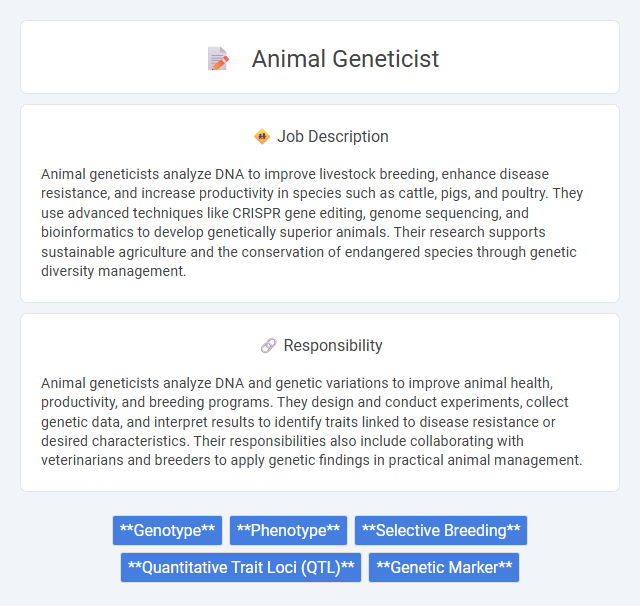
Animal geneticists analyze DNA to improve livestock breeding, enhance disease resistance, and increase productivity in species such as cattle, pigs, and poultry. They use advanced techniques like CRISPR gene editing, genome sequencing, and bioinformatics to develop genetically superior animals. Their research supports sustainable agriculture and the conservation of endangered species through genetic diversity management.
People with a strong background in biology and genetics, combined with a passion for animal welfare, are more likely to be suitable for an animal geneticist job. Those who enjoy research, have analytical skills, and are comfortable working in laboratory and field settings may find this career fulfilling. However, individuals who prefer routine tasks or lack patience for long-term studies might be less suited for this profession.
Qualification
A career as an animal geneticist requires a strong foundation in biology, genetics, and animal science, typically demonstrated by a bachelor's degree in genetics, animal science, or a related field, often progressing to a master's or Ph.D. for advanced research roles. Proficiency in molecular biology techniques, bioinformatics, and statistical analysis is essential for studying hereditary traits and improving animal breeding programs. Practical experience through internships or laboratory research enhances expertise in genetic mapping, DNA sequencing, and gene editing technologies crucial for breakthroughs in veterinary genetics and livestock improvement.
Responsibility
Animal geneticists analyze DNA and genetic variations to improve animal health, productivity, and breeding programs. They design and conduct experiments, collect genetic data, and interpret results to identify traits linked to disease resistance or desired characteristics. Their responsibilities also include collaborating with veterinarians and breeders to apply genetic findings in practical animal management.
Benefit
Working as an animal geneticist likely offers the benefit of contributing to advancements in animal health and breeding, which could improve livestock productivity and disease resistance. The role may provide opportunities for collaboration with research institutions and agricultural industries, enhancing professional growth and knowledge sharing. Financially, salaries and research funding might be competitive, reflecting the specialized skills and impact on sustainable farming practices.
Challenge
Animal geneticists may face complex challenges in identifying specific genes responsible for desirable traits due to the intricate nature of animal genomes. The probability of encountering difficulties increases when integrating new biotechnological tools with traditional breeding methods. Overcoming these challenges often requires continuous learning and adaptation to rapidly evolving genetic research techniques.
Career Advancement
Animal geneticists advance their careers by gaining expertise in genomic technologies and bioinformatics to enhance selective breeding programs. Progression often involves leading research projects, publishing scientific papers, and collaborating with biotechnology firms or academic institutions. Senior roles may include positions such as research director or consultant, influencing livestock improvement and conservation strategies.
Key Terms
Genotype
Animal geneticists analyze genotypes to identify hereditary traits and improve livestock breeding programs. They use advanced genomic tools to map genotype variations linked to disease resistance and productivity. Understanding genotype-environment interactions enables optimized animal health and enhanced agricultural efficiency.
Phenotype
Animal geneticists analyze phenotypes to link physical traits with underlying genotypes, driving improvements in livestock breeding and disease resistance. Detailed phenotypic data collection enables identification of desirable traits such as growth rate, milk production, and coat color. Leveraging phenotype-genotype correlations accelerates selective breeding programs and enhances agricultural productivity.
Selective Breeding
Animal geneticists specializing in selective breeding analyze genetic traits to enhance livestock productivity, disease resistance, and overall health. Utilizing advanced genomic tools and data analysis, they identify desirable alleles for traits such as growth rate, milk yield, and fertility. Their work improves breeding programs by developing genetically superior animals, promoting sustainable agriculture and food security.
Quantitative Trait Loci (QTL)
Animal geneticists specializing in Quantitative Trait Loci (QTL) analyze genomic regions associated with complex traits like growth rate, disease resistance, and milk production. They employ advanced statistical models and molecular markers to identify QTL that significantly influence phenotypic variation in livestock populations. This research enhances selective breeding programs by enabling precise genomic selection to improve economically important traits.
Genetic Marker
Animal geneticists specialize in identifying and analyzing genetic markers to improve livestock breeding and disease resistance. Genetic markers such as microsatellites, single nucleotide polymorphisms (SNPs), and quantitative trait loci (QTLs) provide critical data for selective breeding programs and genomic selection. Advanced techniques in marker-assisted selection enable precise mapping of traits, accelerating genetic gain and enhancing animal health and productivity.
 kuljobs.com
kuljobs.com